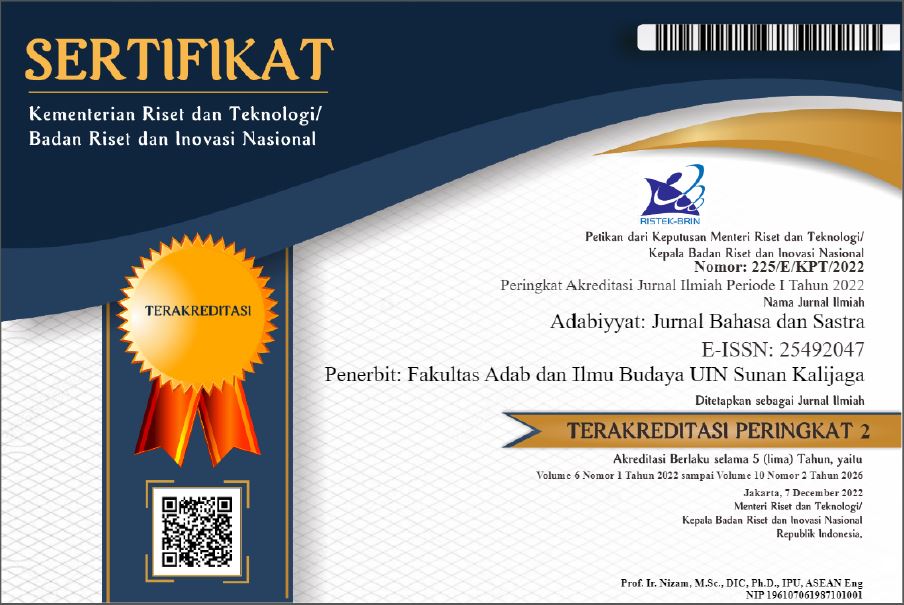ANALISIS WACANA KRITIS PADA CATATAN NAJWA BERJUDUL “TRIAS KORUPTIKA” PERSPEKTIF NORMAN FAIRCLOUGH
DOI:
https://doi.org/10.14421/ajbs.2020.04205Keywords:
critical discourse analysis, catatan Najwa, corruption, Norman FaircloughAbstract
practices that consist of representation, identity and social relationships, so it is closely related to the context beyond discourse. One of the Catatan Najwa TV Programs entitled “Trias Koruptika” indicates the ideology in the text affected by the social context when the record was created. This study aims to see the construction of ideology and social context behind the writing of the text. This research is qualitative descriptive research. A theory used is a critical analysis of Norman Fairclough’s perspective that includes analysis in three dimensions: analysis of language text, discourse practice, and socio-cultural practice. The results showed that in text analysis, Catatan Najwa voiced disappointment, criticism and built a negative representation of three government institutions due to a corruption case. In the practice of discussion, the ideology can be conveyed and accepted well by society. As for the analysis of socio-cultural practices, the issue of corruption conducted by the supreme court judge and other corruption cases in 2013 had a major role in creating Catatan Najwa: “Trias Koruptika”.
Downloads
References
Ailliansyah, Muhamad Agil. 2014. Ini Daftar Anggota DPR Terseret Korupsi 10 Tahun Terakhir. https://m.merdeka.com/politik/ini-daftar-anggota-dpr-terseret-korupsi-10-tahun-terakhir.html.
Andriani, Viena Wanidha. 2019. “Meme Politik Setya Novanto sebagai Representasi Demokrasi Digital di Indonesia: Analisis Wacana Kritis.” Adabiyyāt: Jurnal Bahasa Dan Sastra 3 (2): 231–60.
Cenderamata, Rengganis Citra, dan Nani Darmayanti. 2019. “Analisis Wacana Kritis Fairclough pada Pemberitaan Selebriti di Media Daring.” Literasi: Jurnal Bahasa Dan Sastra Indonesia Serta Pembelajarannya 3 (1): 1–8.
Faiclough, Norman. 1989. Language and Power. New York: Longman Inc.
Fauzan, Umar. 2014. “Analisis Wacana Kritis Dari Model Faiclough Hingga Mills.” Jurnal Pendidik 6 (1).
Habibah, Siti Ummi, dan Geubrina Rizki. n.d. “Trias Corruptika and Public Expectations in Catatan Najwa (Sosiological Criticism: Alan Swingewood).” In Language, Literature and Media in Digital Era. Malang: UIN Maliki Press.
Movanita, Ambaranie Nadia Kemala. 2014. Kasus Suap Penanganan Sengketa Pilkada Akil Mochtar yang Menggurita. https://amp. kompas.com/nasional/read/2014/12/27/15533261/Kasus.Suap.Penanganan.Sengketa.Pilkada.Akil.Mochtar.yang.Menggurita.
Muhammad. 2011. Metode Penelitian Bahasa. Yogyakarta: Ar-Ruzz Media.
Munfarida, Elya. 2014. “Analisis Wacana Kritis Dalam Perspektif Norman Fairclough.” KOMUNIKA: Jurnal Dakwah Dan Komunikasi 8 (1): 1–19.
Semi, M. Atar. 2012. Metode Penelitian Sastra. Bandung: CV Angkasa.
Shihab, Najwa. 2017. Catatan Najwa. Tanggerang Selatan: Literati.
Surastina. 2018. Pengkajian Wacana: Sebuah Pengantar. Yogyakarta: Elmatera publishing.
Yulisna dan Kun Budianto. 2016. Hukum Tata Negara Di Indonesia. Malang: Setara Press.
Downloads
Additional Files
Published
Issue
Section
License
Copyright (c) 2020 Siti Ummi Habibah

This work is licensed under a Creative Commons Attribution-ShareAlike 4.0 International License.
- Adabiyyāt: Jurnal Bahasa dan Sastra publishes all articles entirely in full text.
- It is permissible for readers to download and to use it for scientific purposes and scientific dissemination.
- The author can re-publish the article that has been published by the Adabiyyāt: Jurnal Bahasa dan Sastra after obtaining written permission from the editor. This letter can be obtained by submitting a request letter for permission to republish the article to Adabiyyāt: Jurnal Bahasa dan Sastra via email adabiyyat@uin-suka.ac.id. In the second publication, the author is required to include information that the article was firstly published by the Adabiyyāt: Jurnal Bahasa dan Sastra.



















